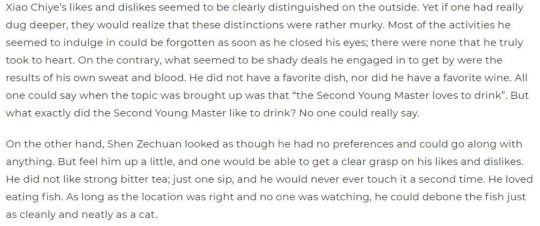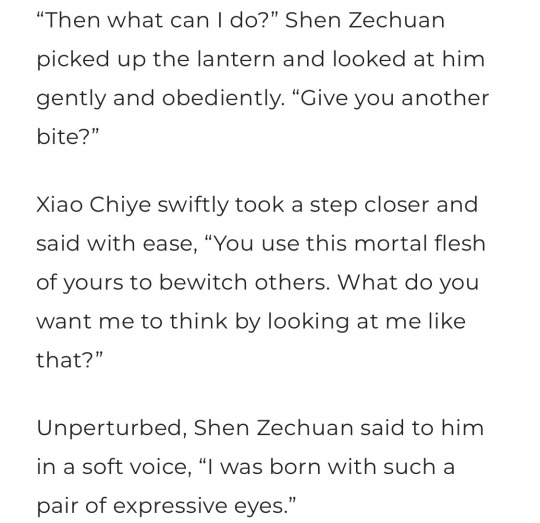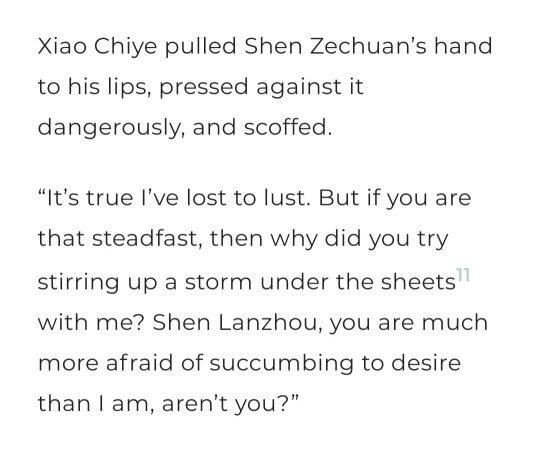Text
On Differential Methods, Politics, & Intimacy for Early Novel!Cezhou (haitang-blossoms' Qiang Jin Jiu meta)
Note: This analysis goes up to Chapter 42 which is where I had read up to before Lianyin's fantranslation was taken down due to official English licensing by Seven Seas. This is also the source of my quoted screenshots of the novel.
The way both Shen Zechuan and Xiao Chiye weaponise perceived incompetence (through fabricated images of "grateful helplessness" and "devil-may-care hedonism" respectively) is so compelling and really serves to flesh out the realities of the environment they are forced to navigate.
It is a recurring narrative motif that both Shen Zechuan and Xiao Chiye are "beasts" trapped and restrained by the political system of Qudu. However, the difference in social position and status between them is key to why they choose the masks that they do.
Shen Zechuan, both as a by-proxy-traitor to the nation and as the son of a dancer, has always had to keep his head down and not act beyond his station. Thus, it is perfectly natural that he operates within this expected framework: both to survive in the hostile political landscape as well as to conceal his own intentions and moves within the shadows.
Xiao Chiye, on the other hand, was born into relative power. While the Xiao Clan of Libei was never in the favour of the Empress Dowager, they are nonetheless a reputable cavalry with a hereditary title. Xiao Chiye, as the second son, has both less direct political influence as well as responsibility than his father (the prince) or his elder brother (the next-in-line). This is how he is so easily made a "bargaining chip" and assigned to what seems to be a hopelessly dead-end job in order to keep a metaphorical "leash" on any rebellious intent that Libei may harbour. Given his wealth and inevitable position of being constantly in the public eye, the easiest way to cover up the target on Xiao Chiye's back is to present himself as a frivolous hedonist who is too busy chasing after liquor and bed-partners to pose a real threat to the established power dynamics of the capital.
The difference between their methods can also be observed in the way that their preferences are perceived by others:

Xiao Chiye presents himself as genial: he loves to drink, he is sociable enough to go out with friends frequently etc. However, as seen in the quote above, Xiao Chiye's "friendliness" is actually quite distant in that even the people who think they know him well are unaware of his true preferences. Yet he conducts himself in such a manner that they would not even think to ponder such things. It is a very effective approach for gathering intel: make the other party assume you are giving away much more about yourself than you are, opening the door for them to carelessly overshare from a sense of fabricated comradery.
Shen Zechuan is the opposite: going along with how he is forced to constantly humble himself and downplay his abilities, his preferences have to be presented as equally accommodating to the will of others. There are many instances where he seemingly goes along with others, secretly gritting his teeth the whole way, in order to "soften" them up to be played into his hand later.
And this goes into my next point:


Even though Shen Zechuan has an image of seductiveness, his entire method revolves around NOT having openly expressed desires because that would only serve as a vulnerability. Xiao Chiye, by contrast, predicates his mask around devil-may-care hedonism.
In this way, desire is both much more familiar to Xiao Chiye as well as easier to integrate into his established reputation than for Shen Zechuan.
This is key to why Xiao Chiye is the first to accept his feelings and why he is much more comfortable with unabashedly expressing them. Thus, I think the differences in how Cezhou present themselves and the contrasting methods they use to stay ahead in their environment have bearing not only on the political games of their world but also on their relationship and how they relate themselves to each other.
#Qiang Jin Jiu#Ballad of Sword and Wine#Tang Jiuqing#Cezhou#Xiao Chiye#Xiao Ce'an#Shen Zechuan#Shen Lanzhou#my meta#my post#analysis
13 notes
·
View notes
Text
Scum Villain Self-Saving System's Endearing Metatextual Layers (haitang-blossoms meta)
A key part of a richly-developed story is having characters and a plot where one can peel back the initial surface understanding of the narrative and, upon closer inspection, continuously discover new perspectives and hidden depths with each successive reread.
However, this is not the general expectation with works primarily marketed as lighthearted “comedies” (perceived differently from the knifey/”serious” works with comedic moments since they are not branded as a “comedy” first and foremost). Due to this gap in expectation, it is even more rewarding to find a work that seemingly doesn’t take itself too seriously at first glance but has an abundance of layers and underlying meaning beneath the basic story.
It is also fantastic when a story’s narrative themes play out for the readers as well in a metatextual, fourth-wall-breaking manner. In this case, the audience and their mindset/understanding is meant to grow with the characters they are experiencing the world with. We, as the readers, go from low expectations of what appears to be shallow comedy to awe at the true thought and hidden effort put into the characters and setting (both of Proud Immortal Demon Way and of Scum Villain itself) which compliments Shen Yuan and Airplane-bro’s own coming-to-terms with the untapped potential of the setting of Proud Immortal Demon Way.
0 notes
Text
On Shang Qinghua and Impersonality (haitang-blossoms' Scum Villain Self-Saving System meta)
The fact that Shang Qinghua (Airplane-bro) IS so callous despite being commonly viewed as pathetic and "comic relief" by both other characters in the story and readers makes his character WAY more interesting!
Because as much as he'll grovel for his life when the situation calls for it, he's really at his core a ruthlessly efficient behind-the-scenes actor who's learnt to project an aura of helplessness in order to survive both from being Peak Lord of An Ding Peak (logistics) and from having to navigate working as a spy for the demons.
While he appears to fill the role of your average comical side-character, one can see how much of an emotional distance he keeps between himself and the other characters no matter how "friendly" he acts on the surface. He never really lets himself get personally invested in anyone for a significant amount of the story. And it's this inner coldness and how it contrasts so sharply with his carefully-crafted outward persona that I find really intriguing.
#Scum Villain Self-Saving System#Mo Xiang Tong Xiu#Shang Qinghua#Airplane-bro#Airplane Shooting Towards the Sky#my meta#my post#analysis
24 notes
·
View notes
Text
Bingqiu and Qijiu as Foils in Their Approaches to Atonement and Forgiveness (haitang-blossoms' Scum Villain Self-Saving System meta)
So first of all, both begin as relationships with a clear "caretaker" role: Qi-ge (Yue Qingyuan) for Xiao Jiu (Shen Jiu) and Shen Qingqiu (Shen Yuan) as Luo Binghe's shizun. In such a dynamic, there's a certain expectation of the older, more experienced one to look out for the younger, less experienced one.
However, both relationships, while initially close, suffer after a "breach" of this code of conduct is committed: wherein, the "caretaker" fails to properly protect and nurture the other.
What's interesting is this: Qi-ge and Shen Qingqiu do this in completely opposite ways. Qi-ge (inadvertently) sabotages his relationship with Xiao Jiu by INACTION (not going back for him) while the issues between Bingqiu begin by a clear (forced) ACTION (Shen Qingqiu pushing Luo Binghe into the Abyss). Neither wanted to do/not do these things but were compelled by circumstances outside of their control.
It's also notable that both Shen Jiu and Luo Binghe undergo a dramatic rise in power before properly reuniting with the other (Shen Jiu becomes an immortal Peak Lord and Luo Binghe gains influence in the Demon Realm and Huan Hua Palace).
This is not only a parallel but can also symbolise how the relationships have become more "equalised" over time. That is not to say that seniority has disappeared, however (Yue Qingyuan is still Sect Leader and Shen Qingqiu is still Luo Binghe's shizun).
Both Yue Qingyuan and Shen Qingqiu feel immense guilt over the part they played in souring their relationships with Shen Jiu and Luo Binghe. However, it is difficult for them to discuss these feelings openly, and so we reach our next theme: sacrifice.
Yue Qingyuan: In the original Proud Immortal Demon Way, he allows Shen Jiu to abuse Orignal!Luo Binghe, willingly allows himself to be trapped and killed by Original!Luo Binghe, and basically turns a blind eye to whatever mistakes Shen Yuan!Shen Qingqiu makes/is accused of in the new timeline due to a misplaced desire to atone for breaking his promise.
Shen Qingqiu: Shen Yuan famously self-destructs to "pay back" Luo Binghe for the wrongs he has done to him in the past, and readers see him protecting Luo Binghe throughout the story for a similar reason despite Luo Binghe's "protagonist halo" supposedly rendering this pointless (the Holy Mausoleum arc comes to mind).
How Shen Jiu and Luo Binghe react is completely different however, and this is key in why Qijiu and Bingqiu's arcs conclude in such contrasting ways.
Shen Jiu: First of all, it is important to note that while Qi-ge was important to Shen Jiu, he largely wasn't there for a long part of Shen Jiu's youth. Stuck at the Qiu residence, he was constantly abused and mistreated, and even though Qiu Haitang was nice to him, trauma like that cannot be easily overwritten. By the time Shen Jiu became Peak Lord, it had gotten to the point where his life had been so devoid of basic affection that his bitterness about Yue Qingyuan's broken promise was able to be magnified to such an extent.
This is not easily helped by the fact that Yue Qingyuan's form of sacrifice is mainly again, through INACTION or is INVISIBLE/SUBTLE to Shen Jiu. There is no defining moment where he directly addresses their past except at the end of the story to Shen Yuan!Shen Qingqiu which doesn't help Shen Jiu at all.
Luo Binghe: By contrast, Luo Binghe had lots of positive interactions with Shen Qingqiu in the many years leading up to the Abyss. While this may have made the betrayal sting more at the time, it also set up Luo Binghe to be able to not outright hate Shen Qingqiu after the fact (a more nuanced emotional reaction).
The self-destruction is such a definitive ACTION (and it helps that Shen Qingqiu spelt out that he was "repaying" Luo Binghe for past wrongs by doing so) that Luo Binghe is able to reconcile the situation and his feeling towards Shen Qingqiu where Shen Jiu was not able to towards Yue Qingyuan.
The next theme of "love" also plays off this difference as well. Due to a combination of trauma and his own personality, Shen Jiu was shown to struggle to love whether it be others or even himself. Any potential he had was overshadowed by the bitterness and envy that later come to define his character in Proud Immortal Demon Way. Yue Qingyuan's passive approach to Shen Jiu only served to enable these feelings and the resulting disastrous actions.
Luo Binghe was abandoned throughout his life (whether by choice or not is inconsequential), and this defines a lot of his character later on.
As White Lotus Luo Binghe, he's eager to please, and it's clear how starved for affection he is based on how much stock he puts in every kind act that Shen Qingqiu shows him. But a key aspect of Luo Binghe is that he believes he must continuously EARN this affection through reciprocity which is part of why it's so natural for him to serve Shen Qingqiu with his cooking and basically running Qing Jing Peak.
This plays into another difference between Shen Jiu and Luo Binghe: that while both suffer from lack of (perceived at least) affection, Shen Jiu retaliates by pushing everyone away while Luo Binghe instead seeks it out and returns any love given to him tenfold (even in Proud Immortal Demon Way, he spares and married Ning Yingying when he destroys Qing Jing Peak because she was nice to him in the past). And the fact that Shen Qingqiu is visibly remorseful of the past only reinforces this instinct.
Even when Luo Binghe almost goes mad from the influence of the Xin Mo sword, it is Shen Qingqiu taking direct and unmistakable ACTION (in this case, papapa to save the world) that saves them and their relationship. Bingqiu were able to reconcile because both parties were willing to actively WORK to rebuild it, which takes conscious and purposeful effort.
Qijiu ended up missing each other by seconds, so to speak, because they were too PASSIVE in regard to their relationship with each other. Shen Jiu never directly confronts Yue Qingyuan about his actions (or lack thereof) and instead stews in bitterness alone, while Yue Qingyuan is so busy walking on eggshells around Shen Jiu that he misses the one thing that could mend their relationship.
Both relationships contain heartache and misunderstandings, but their contrasting approaches to reconciliation, atonement, and forgiveness is ultimately the factor that determines how their stories conclude.
#Scum Villain Self-Saving System#Mo Xiang Tong Xiu#Bingqiu#Qijiu#my meta#my post#analysis#Luo Binghe#Shen Qingqiu#Yue Qingyuan#Shen Jiu
46 notes
·
View notes